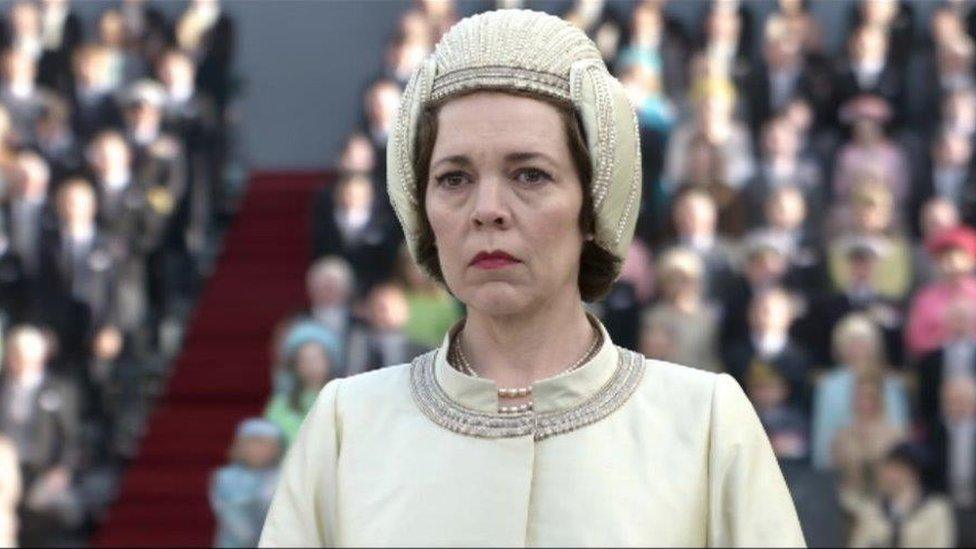Steve Backshall: Why I'm learning Welsh
- Cyhoeddwyd
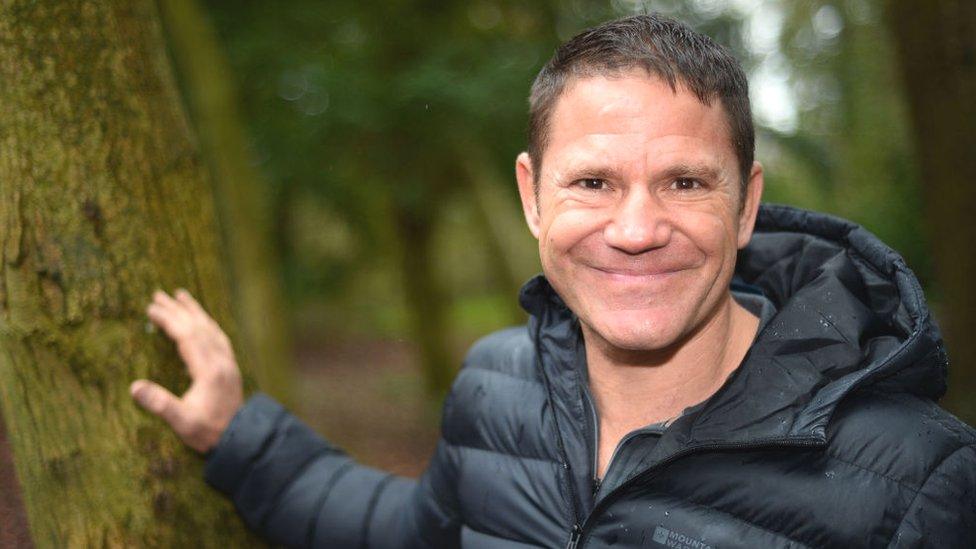
Steve Backshall: "The wildest Welsh places have been a huge part of my life"
Steve Backshall is a naturalist, adventurer, traveller and presenter who has appeared on TV channels around the world.
He has won several BAFTAs and his programme on the Discovery Channel, Expedition Borneo, won an Emmy in the United States.
He has written travel books and led expeditions to the mountains of the Himalayas and South America, as well as running the gruelling Marathon des Sables ultra-marathon in the Sahara Desert.
But Steve is facing a very different challenge at the moment, learning Welsh.
Here he explains why he has chosen to learn the language and how he has enjoyed the experience.

The older I've got, the more I've yearned for heritage, for a sense of belonging and coming from somewhere. My wife Helen is Cornish and both sides of her family are Cornish going back at least a dozen generations. And I envy that and desperately want it for my children.
I come from an area of southern England that is utterly homogenous. All the history near me is about royalty and fealty, things which leave me cold. I lack roots, and have great warmth for places that have them. My favourite Welsh word is hiraeth which fills me with melancholy and doesn't really have a literal translation, but seems to mean "belonging, and longing for one's homeland".
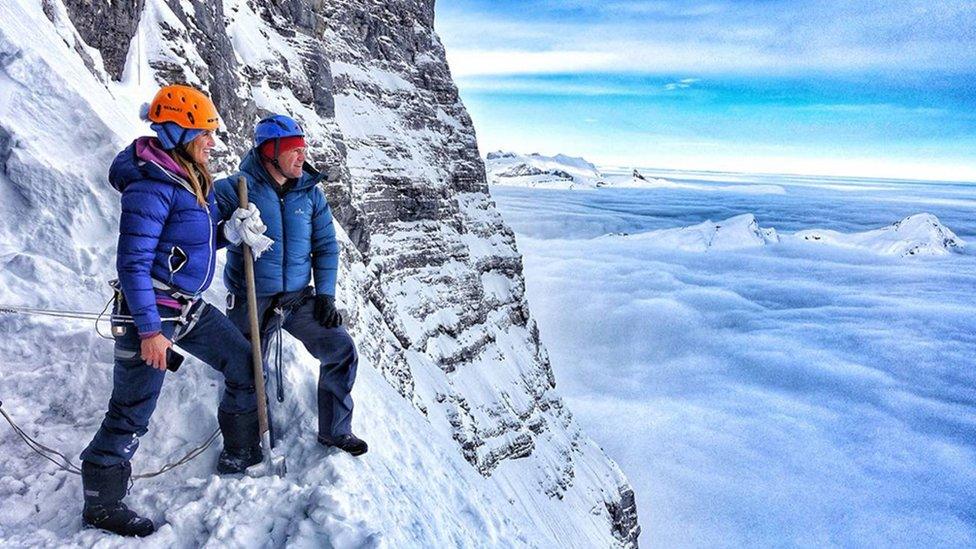
Steve climbing the Eiger in Switzerland
Wales, and particularly the wildest Welsh places, have been a huge part of my life. Growing up I have misty memories of being dragged up the Glyderau and Carneddau by my hyperactive parents, of floating away on my camping airbed during a particularly stormy night.
Later on when I discovered fell running, I turned to the peaks of the Brecon Beacons, climbing in Llanberis and sea kayaking the Gower.
'Wales has been very good to me'
When I came to prepare for my latest expedition - a first descent of a whitewater river in Russia - I headed to the Dee, to Bala and Plas Y Brenin for my training, and I've just taken up an honorary lectureship at Bangor University (the best uni for a student of the natural sciences in the nation!).
Wales has been very good to me and yet I have to admit I had never even thought to learn any spoken Welsh... and that is totally crazy.
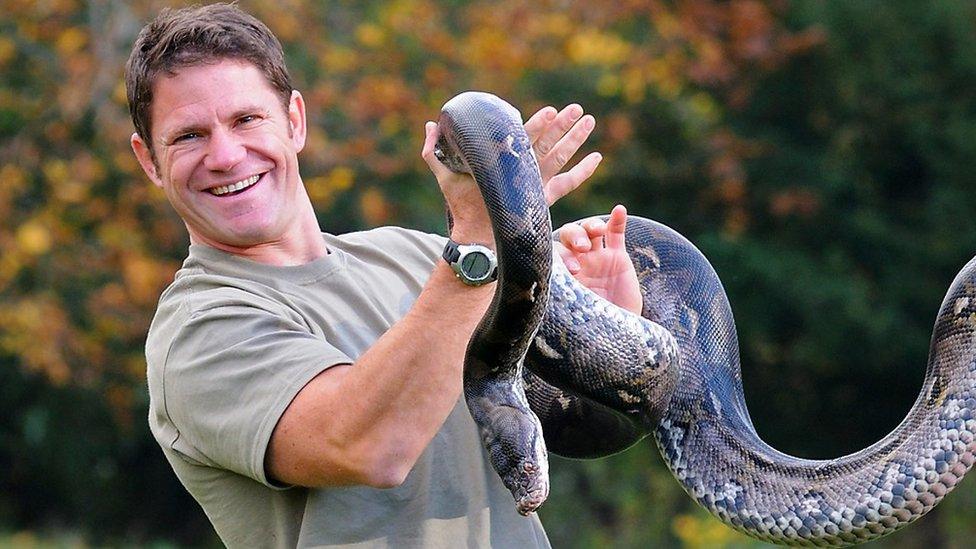
Steve presented the popular children's nature programme The Really Wild Show from 2004 to 2006
I've been travelling for a living since the mid 1990s, first as a travel writer, then as 'Adventurer in Residence' with National Geographic. If anyone asks me for advice on how to be a good traveller, I respond 'learn the language - nothing transforms your welcome in a country more than showing willing to communicate in the native tongue.' And yet Welsh...
In October of this year, S4C got in touch with me to ask if I fancied doing their 'Iaith ar Daith' programme. They sent me a link to watch Adrian Chiles and Scott Quinnell learning Welsh on a journey. I was thoroughly charmed by the programme, and horrified by the absolute zero I knew.
Caniatáu cynnwys X?
Mae’r erthygl yma’n cynnwys elfennau sydd wedi eu darparu gan X. Gofynnwn am eich caniatâd cyn eu llwytho, oherwydd fe allai wneud defnydd o cwcis a thechnolegau eraill. Efallai y byddwch am ddarllen polisi cwcis X, dolen allanol a pholisi preifatrwydd, dolen allanol cyn derbyn. I weld y cynnwys yma dewiswch ‘derbyn a pharhau’.

How could I have spent so much of my life in Wales and not even know how to say hello, please, or thank you? I carry a hefty amount of residual shame as well, as the English are the worst nation in the world for learning other languages. (Even the Americans have a higher tak- up of second languages than us).
'Iolo, a personal hero'
An extra carrot being dangled was that I would get to do my language journey with Iolo Williams - the godfather of Welsh wildlife and a personal hero.
To seal the deal, I was due to spend two weeks before the journey on a dive boat in the middle of the Pacific. Life aboard a dive boat filming is the only time I get decent amounts of free time in a day (I have a two-year-old and baby twins at home!) So bring it on!
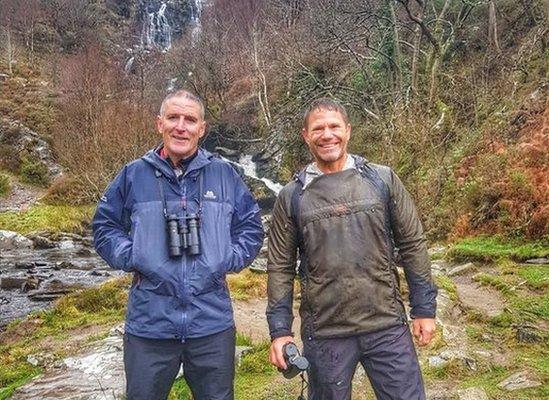
Steve with 'the godfather of Welsh wildlife', Iolo Williams
To begin with I learned on the app Say Something in Welsh, doing approximately 30 hours of study on my two weeks at sea. This was a good grounding, but it was on the road with Iolo and the Welsh-speaking film crew that it all really started to spark in my head.
All of my preconceptions about Welsh were wrong. So many people denigrate the language as ugly - as sounding harsh, Germanic, and of covering the listener in spit.
All of these things are nonsense, Welsh is a lyrical, dancing, joyous song of a language that delights the ear and so different depending on location - every member of my team had clear dialects and different intonation, some breathy and Nordic, others ripe and hearty.
And the words! Sbigoglys, sboncen, bendigedig, chwyrligwgan... how would I ever go back to saying these things in English?!
The animal and bird names have the most delightful descriptive quality - cnocell y coed, glas y dorlan, pili pala, gwdihŵ... it didn't feel like a chore to learn, because every new word was nectar.
Caniatáu cynnwys X?
Mae’r erthygl yma’n cynnwys elfennau sydd wedi eu darparu gan X. Gofynnwn am eich caniatâd cyn eu llwytho, oherwydd fe allai wneud defnydd o cwcis a thechnolegau eraill. Efallai y byddwch am ddarllen polisi cwcis X, dolen allanol a pholisi preifatrwydd, dolen allanol cyn derbyn. I weld y cynnwys yma dewiswch ‘derbyn a pharhau’.

But the best thing about the whole experience has been the reaction from the Welsh public, both online and in person. From Welsh rugby tours to Bridgend and Merthyr Tydfil as a boy and young man, I've learned the hard way about Anglo/Welsh rivalries.
The baying crowds at the Arms Park during my first Five Nations games, made me want my seat to swallow me up!
I honestly expected me learning Welsh to be met with a certain amount of cynicism, even outright hostility from some. But that hasn't happened.
Welsh speakers are delighted if you even have the respect to say 'hello' to them yn Gymraeg. But try and have a conversation... people smile, they praise you, speak as slowly as they can, holding your hand through the process.
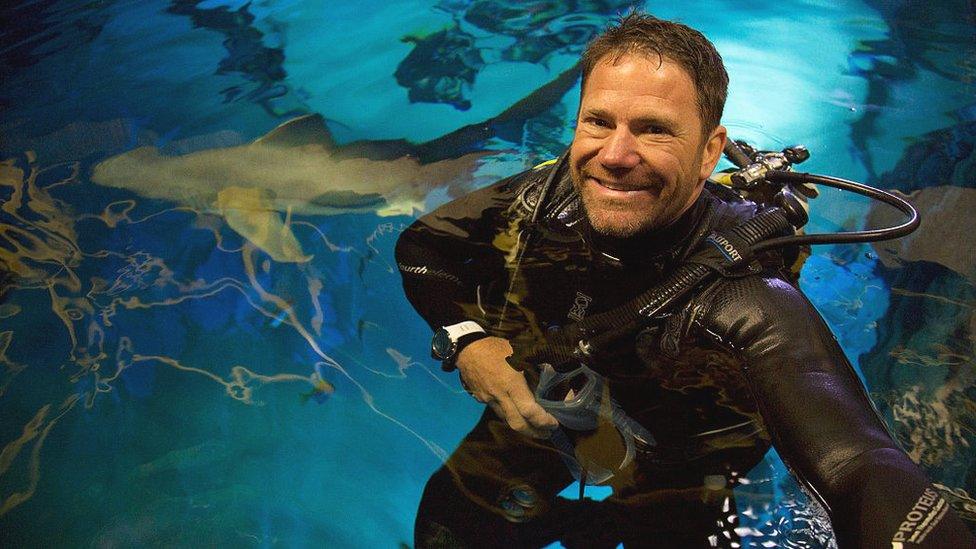
Steve Backshall: "Thank you the people of Wales for helping me"
And the language itself is also not as tricky as I expected. Granted I had a head start, having studied many languages before, but many of the idiosyncrasies start to come to you naturally once you start speaking, exactly as they do when you're learning a language for the first time as a baby. You just need to speak it as much as possible.
At the end of my four days on the road with Iolo, I could hold a stilted conversation. I know this will fade away a certain amount now I've left my little Welsh crew behind… a dwi'n drist iawn achos dwi isho parhau i siarad Cymraeg (I'm very sad about this as I want to continue speaking Welsh)
Mae'r iaith yn hardd, yn bwysig a pherffaith. Diolch yn fawr pobl Cymru am helpu fi! (The language is beautiful, important and perfect. Thank you the people of Wales for helping me!)
This article was first published on BBC Cymru Fyw in Welsh
Straeon perthnasol
- Adran y stori
- Cyhoeddwyd24 Tachwedd 2020
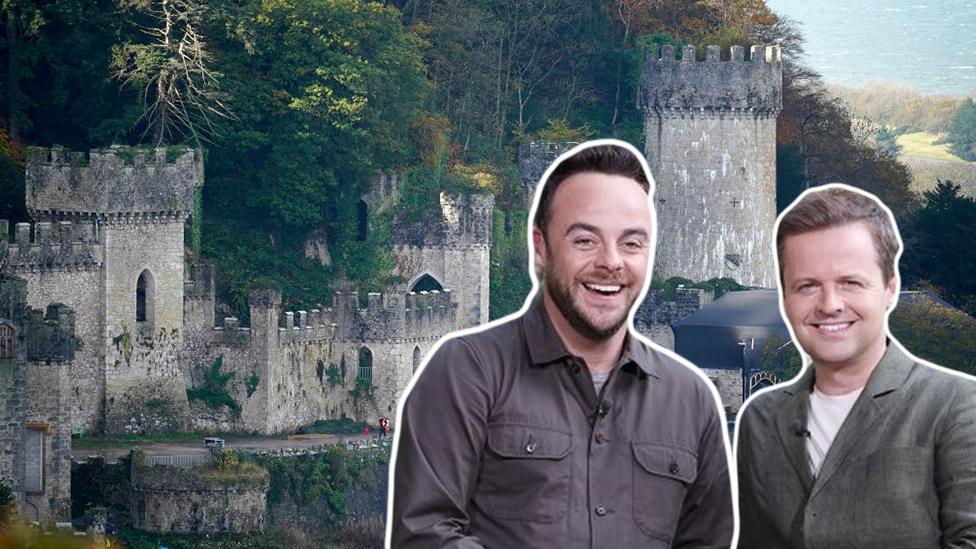
- Adran y stori
- Cyhoeddwyd28 Ebrill 2020
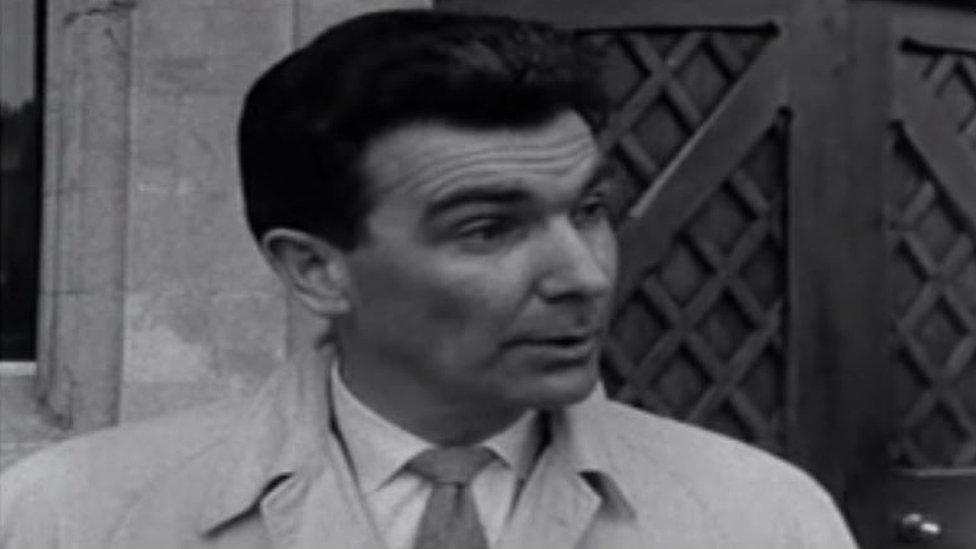
- Adran y stori
- Cyhoeddwyd26 Tachwedd 2019
